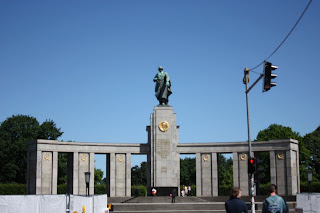Exploring Germany
Friday, July 9, 2010
The Berlin Wall
As a memorial for this time nothing stands out greater than the Berlin Wall itself. It stood like a knife dividing the city, tearing apart families, communities and the city infrastructure that the city had worked so hard on to recreate after the war. Though only small sections of the wall remain as the memorial itself, the wall within the mind of many of the people still remain.
Check Point Charlie is another important memorial to the time. It shows what all a person had to go thorough in order to escape from East Berlin, things often that seemed impossible. The fall of the Berlin wall is such a resent event in German history that few speak of it, it is such a fresh memory because many of the citizens of Berlin experienced it.
The Cold War and the Berlin Wall were mostly political power struggles that left little physical scars, mostly they left mental scars on the people affected the greatest during the time.
There is no doubt that Germany’s role in World War II is how the small European country is mostly remembered. A time in history that will not soon be forgotten.
There are many governments and people that simply want to erase their wrong doings and forget the crimes they have committed. A primary example would be the insufferable cruelty the American soldiers and settles did to the American Indians. Entire tribes were kicked off of their land and murdered to make way for settlers. Many people wanted to completely destroy them like the Jewish race because they were considered unclean and uncivilized. However, for the most part Americans chose to forget this time in history and the horrible crimes committed against the American Indians. Therefore, it is quite admirable that Germany chooses not to push parts of their history under the table.
The memorials remember the discrimination, persecution, expulsion, murder of Jews in a number of ways and are placed in important public places that are easily found within the city. Showing that the Germans are not trying to hide this time in their history but learn from it demonstrating to future generations the remorse they feel for that period in time.
The concepts for the various memorials are very different from one another and are spread throughout the city. There is Peter Eisenman, Memorial to the Murdered Jews of Europe, which was heavily debated for nearly a decade, due to its close proximity to the Brandenburg Gate. Another is the New Guard House which is dedicated to the victims of War and Tyranny. There is also various monuments built by the Soviets shortly after the war as if to say, “Look what you have done, and what we had to do to stop you.”
Monday, July 5, 2010
The Wall Jumper
The manner in which The Wall Jumper is written expresses how someone might feel who lived along the Iron Curtain during the Cold War. The book tends to jump around quite a bit from story to story, which causes the reader to become somewhat confused. Schneider is trying play on that confusion, and portray the back and forth emotions people felt that lived in Berlin during this time and how they adapted to their unique circumstances. It also allows the author to show that humans do not need repressive governments to build boxes for them; people are quite capable of doing that themselves.
The narrator is from West Berlin, therefore naturally he sides with the minds of the West Berlin Government. As the stories progress he begins to understand how each government is trying to mold the thoughts of its people to suit the needs of their social system; concluding that no matter which side of the wall a person maybe living on, they are still being manipulated. This reduces the wall to a metaphoric allusion of its time, allowing Schneider to explore the boundary between the state and the individual.
There is an argument with a friends because they interpret exactly the same news item through entirely different views: “…I take what I see at face value; Robert has been trained to read between the lines. Where I perceive merely an event, maybe an accident, Robert perceives a plan that he has to decipher.” Showing how differently the two states are taught to think.
Throughout the many stories there are East Germans who have moved to West Berlin in search of freedom and there are those who have chosen to stay in East Germany because they are convinced that the bounty of the West is just a mirage. The book best states it by saying, “It will take us longer to tear down the Wall in our heads than any wrecking company will need for the Wall we can see.”

































